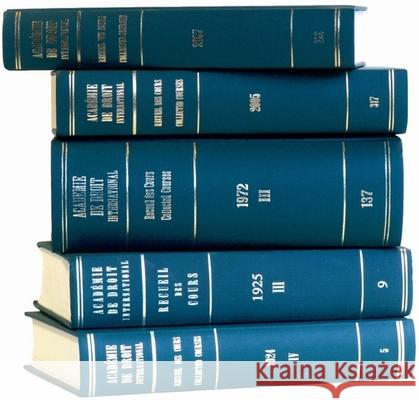Recueil Des Cours, Collected Courses, Tome/Volume 372 » książka
Recueil Des Cours, Collected Courses, Tome/Volume 372
ISBN-13: 9789004289376 / Angielski / Twarda / 2015
La competence universelle civile, par A. Bucher, professeur honoraire de l'Universite de Geneve: La competence universelle a preoccupe la communaute internationale surtout sous l'angle de la repression penale. Le droit international n'a guere developpe le soutien politique et l'arsenal juridique servant a la protection directe et individuelle des victimes de graves atteintes a leur dignite humaine. On a dit que celles-ci ne disposeraient pas d'un droit de reparation a faire valoir a l'encontre de l'Etat responsable. Ces temps ont change. En sus de l'indemnisation, les victimes doivent avoir la garantie d'un acces effectif a la justice. C'est une obligation erga omnes a la charge et dans l'interet de tous les Etats. Ceux-ci doivent donc assurer qu'il existe un tribunal competent tout au moins en dernier recours. Si les tribunaux ne peuvent etre saisis selon les regles ordinaires, le principe de la competence universelle oblige tout Etat a accepter l'acces des victimes de telles graves violations des droits de l'homme, quitte a se declarer competent a titre subsidiaire seulement s'il existe un for plus approprie et accessible ailleurs. Limitations on Party Autonomy in International Commercial Arbitration by G. Cordero-Moss, Professor at the University of Oslo: International commercial contracts often contain a choice of law clause and an arbitration clause. The parties are often convinced that the choice of law clause in the contract excludes that any other country's law is applicable to any aspect of their relationship; even more so when the contract contains an arbitration clause. Arbitration is, as known, based on the will of the parties, and the tribunal is supposed to follow the parties' instructions. Hence, a contract with an arbitration clause apparently enhances the parties' reliance on the choice of law they made in the contract and the disregard of any other laws. Choice of law clauses are, however, not always capable of fully achieving the results desired by the parties. There are several limits to the effects of these clauses. These limits may depend on the scope of party autonomy, on overriding mandatory rules of other laws or on illegality in the place of performance. The course intends to show that an arbitration clause does not necessarily prevent the applicability of rules belonging to a law different from the one chosen by the parties: some of these rules cannot be disregarded even by an international arbitral tribunal and, if they are, the award will be invalid or unenforceable. Intellectual Property: Cross-Border Recognition of Rights and National Development by M. Sinjela, Professor at the University of Lusaka: Intellectual property is defined as the creation of the human mind, which becomes valuable when reduced into a tangible form. Many view intellectual property as a monopoly. Western countries have used it over the centuries as a tool for wealth creation, while developing countries have thus far not embraced it fully and are unsure of its pivotal role in wealth creation and national development. To demonstrate the benefits that could accrue to developing countries that embrace intellectual property, the lectures firstly provide a succinct understanding of the entire subject including patents, trademarks, copyright, geographic indication of origin and the protection of new plant varieties. This is intended to give an understanding of the subject that is otherwise little known particularly in developing countries. The lectures proceed to inform the reader how developing countries that use the intellectual property system could derive maximum benefits from it, just like countries in the west have over the centuries. The lectures are intended to provide a clear understanding of the vital role that intellectual property plays in wealth creation and national development for countries that embrace and mainstream it in their decision-making process and national development agenda. International Co-operation in Energy Affairs by R. Dolzer, Professor at the University of Bonn (Retired): These lectures explore the legal framework of current international cooperation in the various fields of energy by international organisations, together with the incentives and the impediments for stronger international action. While the opportunities for cooperation are obviously broad, the concept of natural sovereignty over natural resources dominates the current realities. The study also includes recommendations for possible ways to strengthen the current weak ties of cooperation.











